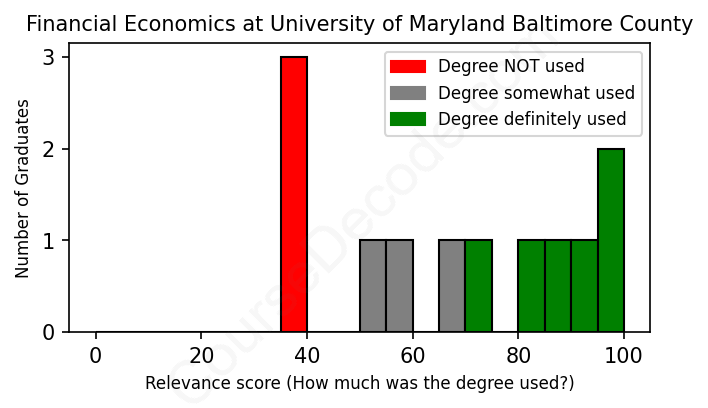
First, some facts. Of the Financial Economics graduates from University of Maryland Baltimore County we've analyzed , here's how many have used (or NOT used) their degree in their career:

These are estimates based on AI analysis of 12 LinkedIn profiles (see below).
The verdict? Slightly above average. Overall, with an average relevance score of 68%, Financial Economics graduates from University of Maryland Baltimore County have a slightly higher likelihood (+1%) of finding work in this field compared to the average graduate across all fields:
And for comparison, here's the chart for all profiles we've looked at across all degrees.
Also, after graduating, only 16% of these graduates have pursued further education other than another Bachelor's degree (such as a Masters degree or other), compared to the average across all profiles of 35%. This suggests a Bachelors degree is enough for most Financial Economics graduates, and it's normal to look for work straight after graduation.
See the details:
|
Relevance score: 100% We think this person has gone into a career highly relevant to their degree. We think this person has gone into a career highly relevant to their degree.
DEGREE INFOGraduated in 2022 from University of Maryland Baltimore County with a Bachelor of Science - BS in Financial Economics. No other secondary education since. JOB HISTORY SINCE GRADUATIONFinancial Analyst Morgan Stanley Jan 2023 - Present ABOUTNo information provided. |
The top 10 most common jobs done by the graduates we've analyzed (ranked most common to least) are:
After analyzing LinkedIn profiles of graduates from the University of Maryland Baltimore County with a degree in Financial Economics, it seems that many of them have ended up in roles that either directly or somewhat relate to financial economics. The most common types of positions include analysts—like Financial Analysts and Business Analysts—as well as managerial roles in finance. Some have taken on positions in project management or operations support, which occasionally leverage their analytical skills but don't fully tap into the economics part of their education. Interestingly, while some jobs, like those at Morgan Stanley or financial firms, are tightly aligned with financial economics, others like Valet or Tax Preparer seem far removed from the major, indicating a mixed bag of relevance to their degree. Overall, there's a clear trend: graduates who land in more analytical positions generally find their roles to be quite relevant to financial economics, while others drift into jobs where their degree is not as applicable.
In summary, while there are definitely graduates who have secured solid roles that make good use of their financial economics background, many others find themselves in positions that don’t fully utilize their skills and knowledge from their degree. It’s a reminder that the job market is diverse, and sometimes, the path from college to career doesn’t exactly follow the expected route of applying specific academic training. So, for those studying financial economics, it might be worth exploring a variety of career options, especially those that strike a balance between their education and personal interests!
Here is a visual representation of the most common words in job titles for Financial Economics graduates (this is across all Financial Economics graduates we've analyzed, not just those who went to University of Maryland Baltimore County):

Looking at the career trajectories of graduates from the Financial Economics program at the University of Maryland Baltimore County, it’s clear that many of them have found their stride in fields that are quite relevant to their studies. Right after graduation, a good number of these alums seem to step into roles like data analyst or finance-related positions. For instance, graduates from 2012 often started as junior analysts or project associates, which is a solid entry point into the business and finance world. Over the years, many have climbed the ladder, moving into senior positions such as financial analysts and finance managers, which reflects positively on the skillset they acquired during their degree.
Fast forward 5 to 10 years, and it looks like a lot of these folks are not just hanging around in entry-level jobs. Many have shifted into senior roles or even have started their own companies, suggesting they are capitalizing on their backgrounds in economics and finance. You see graduates becoming principals and co-founders of firms, moving into managerial positions in big corporations, or even stepping into significant roles in government. While there are definitely some who’ve ventured off into unrelated fields or took on various odd jobs early in their careers, the overall trend shows that a degree in Financial Economics from UMBC is paving the way for meaningful and rewarding career paths that align with their educational background. So, if you’re considering this degree, it seems like a pretty good bet for a successful future!
Honestly, a Bachelor’s degree in Financial Economics can be a bit of a mixed bag—it’s not the easiest degree out there, but it’s also not the toughest. At the University of Maryland Baltimore County (UMBC), you’ll find that it blends economics with finance, which means you’ll be dealing with a fair amount of numbers, graphs, and economic theories. Some classes can get pretty challenging, especially if math isn’t your strong suit. But if you have a solid interest in how financial systems work and you're willing to put in the effort, you'll likely manage just fine. Overall, it's a strong program but expect to put in some serious study hours to really get the hang of it!
Most commonly, in the LinkedIn profiles we've looked at, it takes people 4 years to finish a Bachelor degree in Financial Economics.
Looking at the job histories of these Financial Economics grads from the University of Maryland Baltimore County, it's clear that most of them have been able to snag positions that generally pay pretty well, especially in finance and data analysis roles. Some, like the senior analyst and finance manager at Samsung, likely make a solid income given their experience and the reputation of the company. The co-founder of a commercial brokerage and the assistant district attorneys also seem to be in lucrative positions. Others, like those starting off as junior analysts or accounting assistants, might be on the lower end of the pay scale initially, but those roles often lead to better opportunities down the line. Overall, it seems like they're all on a decent path towards making good money in their careers!
Here is a visual representation of the most common words seen in the "about" section of LinkedIn profiles who have a Bachelor degree in Financial Economics (this is across all Financial Economics graduates we've analyzed, not just those who went to University of Maryland Baltimore County). This may or may not be useful:

Here are all colleges offering a Bachelor degree in Financial Economics (ordered by the average relevance score of their Financial Economics graduates, best to worst) where we have analyzed at least 10 of their graduates:
| College | Score | Count |
|---|---|---|
 University of Maryland Baltimore County University of Maryland Baltimore County
|
68 | 12 |